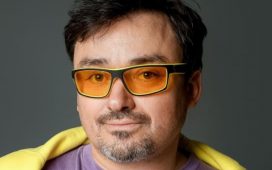Mika is a certified medical product for cancer patients, offering a personalized app and holistic platform for therapy support.
Please introduce yourself and your startup Mika to our readers!
We are a young company dedicated to empowering people affected by cancer. Our team is a highly motivated collection of interdisciplinary healthcare enthusiasts, consisting of psychologists, physicians, software developers, and designers, among others.
Mika is an evidence-based certified medical product for cancer patients and supports those affected with a personalized app and holistic platform throughout their therapy. Cancer patients and their relatives are accompanied during the time of illness and treatment to better cope with the challenges in this difficult phase – with relevant guidance and coaching programs on symptom management, nutrition, sports, resilience/mental health, financial and legal aspects and many more.
How did you get the idea of Mika?
In our private environment we have experienced how difficult it is for patients and their relatives to deal with the disease. There is also a large body of evidence-based approaches that positively contribute to cancer outcomes but the majority of it is hidden in academic papers and not actionable for patients. At the same time, we firmly believe that digital support can improve cancer therapy – and our latest clinical research confirms that.
Why did you decide to start with Mika?
Starting a company was the ideal way for us to combine entrepreneurial action with real added value for people. I strongly believe that a market-oriented approach in this is the right way to develop and scale truly innovative solutions that have the potential to changes people’s lives and healthcare reality.
What is the vision behind Mika?
We want to support patients in taking an active role in their therapy to improve quality of life and therapy outcomes. We want all those affected to feel truly accompanied in their daily life living with cancer. In the long term, we aim to be an integral part of oncological care – and to contribute to better survival rates and treatment outcomes in oncology.
How difficult was the start and which challenges you had to overcome?
As a Digital Health company, we face specific challenges. Our medical product is subject to specific regulations that also affect our development processes. Other issues include the long “sales cycles” in healthcare, for example, when working with health insurance companies, and building teams of Digital Health specialists. Since we started, the interest and understanding in the investor domain has significantly developed. Scaling from a German national brand and product offering to an international presence serving patients now in the UK and in 2024 in the US and other EU countries also adds an additional layer of complexity.
Who is your target audience?
All people affected by cancer – patients and relatives. We especially support the phase from diagnosis throughout the entire therapy. Mika is available for all types of cancer, treatment or stages. We also receive a lot of positive feedback from our users and see corresponding metrics in their usage of the Mika platform. Patients tell us that Mika gives them motivation and hope during therapy and that they can better assess and deal with symptoms and challenges of a life with cancer.
What is the USP of your startup?
First, traction: Mika has served >100.000 cancer patients and has therefore unique insights into realities and challenges that patients face. This traction has also allowed us to train proprietary machine-learning algorithms to recommend the right content and intervention at the right time to the right patient which has resulted in significant increase in engagement and ultimately, clinical evidence. Secondly, Mika has the largest and strongest body of clinical evidence in our domain (oncology focused digital therapeutics) based on several randomized-controlled clinical trials. These studies have proven the impact of Mika on the treatment outcomes for patients and provide trust by patients, doctors, nurses and our partners in the healthcare ecosystem.
Can you describe your typical workday?
In a remote setting, the typical workday consists of several calls both internally (solving urgent issues, updates on ongoing projects, investors/ board) and externally (fundraising, potential partner institutions across healthcare and internationally) as well as some time blocked for strategic thinking and discussions – mainly with members of the leadership team.
For the in-office days, I try to spend time with team as many members as I can to understand their challenges and perspective but also convey my thinking. Building and leading teams in a hybrid working mode post-Covid is no easy task and we closely watch team dynamics and happiness. I also try to get inspiration from outside the company and have frequent interactions with other companies in the healthcare domain and beyond. It is a marathon but in many disciplines at the same time.
Where do you see yourself and your startup Mika in five years?
We continue to build on our position as globally leading player in our field and want to expand to additional markets and aim for deeper integration with healthcare partners such as hospital networks. We measure progress along various KPIs but at the end of the day the foundation for our success comes down to impacting as many people as possible with the best possible impact on their lives with cancer.
What 3 tips would you give to founders?
- Never stop building a great team.
- Gain clarity on your commercial model as soon as possible.
- Find a balance of personal and professional life early on.
Picture Credits Viktor Strasse
Thank you Dr. Gandolf Finke and Dr. Jan Simon Raue for the Interview
Statements of the author and the interviewee do not necessarily represent the editors and the publisher opinion again.










